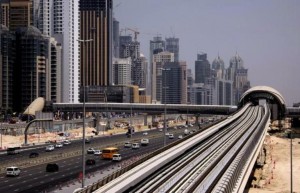Source: www.cpifinancial.net
Public transportation and rail infrastructure projects in the GCC countries saw tremendous growth over the last few years, with rail and metro projects leading the way in terms of the total value of the completed and underway projects, hitting $10,270,000, in Qatar, the UAE and the KSA.

Public transportation and rail infrastructure projects in the GCC countries saw tremendous growth over the last few years, with rail and metro projects leading the way in terms of the total value of the completed and underway projects, hitting $10.270.000, in Qatar, the UAE and the KSA.
GCC financial observers and economists see the figure is projected to increase in the light of the urgent need for developing more projects in the future, including the pan GCC train project, linking Kuwait to Oman via Qatar, the UAE, the KSA and Bahrain. This giant project is a testimony of the importance of Public Private Partnership (PPP) in developing ambitious public infrastructure projects.
Mr. Omar Al Juraifani, a financial and economic analyst, said: “The rail and metro projects are large scale infrastructure developments that require huge investments, and that in return create a large number of jobs and generate stable return on investment. Therefore, public private partnership is needed to guarantee delivery on time and to the best standards of quality and cost effectiveness.
Mr. Al Juraifani added: “Prof Dr Kim Gario, a UN expert in national strategy, said in his speech on the recent Kuwait Metro and Rail Conference and Exhibition that each $100 billion invested in public transportation sector in the USA creates 4000 jobs, and each $1billion invested in this sector generates $3.5 billion in the Gross Domestic Product (GDP). The question here: how many job opportunities have these mega projects created? How much was the contribution to the GDP?”.
Al Juraifani believes that this important industry must be nationalized from the very beginning, and that the KSA and the GCC governments must benefit from the foreign companies developing rail and metro projects in their countries by taking such steps as transferring these technologies to national experts, establishing the national institute for rail and metro to be the umbrella for all companies developing the project and planning Saudization employment rate of at least 80% in 5 years, where Saudi engineers, operators and maintenance technicians will be given jobs.
Value of tenders must not only depend on the value of the lowest tender but on evaluating the mechanism of transferring expertise and training of national cadres to allow partnerships and thus high returns for the interests of Saudi people, investor, and national economy.
The list of announced completed and ongoing projects in the GCC countries includes the Metro Dubai in Dubai, a $4.5 billion project according to the Roads and Transport Authority, and the Holy Rituals Train in Makkah, with an investment of $1.77. The value of transportation market in the KSA is estimated at SR70 billion (more than $18 billion), according to Al Riyadh newspaper. Qatar follows suit of its neighboring countries with the recent announcement of a $4 billion modern metro network, as part of its preparations to host FIFA World Cup 2022 in Doha.
















